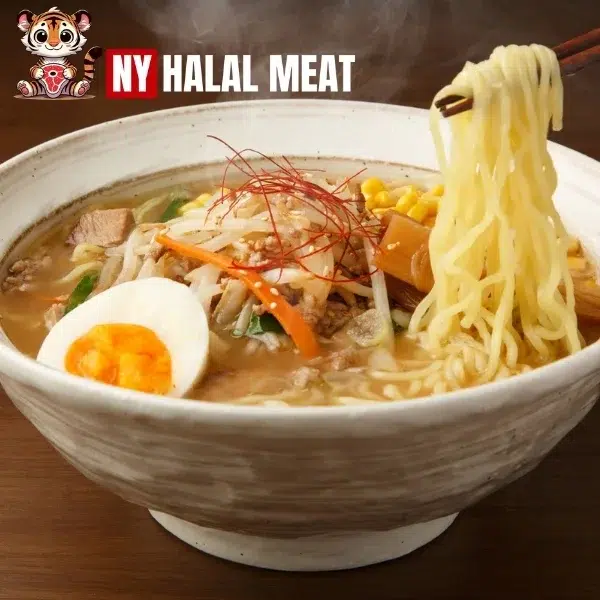Is Ramen Halal in America? A Complete Guide
Understanding Halal Food Guidelines
Before we dive into whether ramen is halal, it’s essential to understand what “halal” means. In Islamic dietary law, halal refers to food and drink that are permissible according to the Quran and Hadith. Halal foods must avoid ingredients or methods that are prohibited, or haram, in Islam. These include pork, alcohol, and improper animal slaughter. In short, halal foods must be free from anything that Islam considers harmful or forbidden.
What Makes Ramen Non-Halal?
While ramen itself is a simple dish consisting of noodles, broth, and toppings, several factors can make it non-halal:
- Pork-Based Broth: Traditional ramen often uses pork-based broths, especially the popular “tonkotsu” variety. Since pork is haram in Islam, any ramen made with pork or pork-based ingredients is not halal.
- Non-Halal Meat: In addition to pork, other meats such as shrimp or non-halal slaughtered chicken may be used in ramen dishes. If the meat is not halal, the entire dish becomes non-halal. Even when chicken or beef is used, it must be slaughtered according to halal guidelines.
- Alcohol in the Broth: Many traditional ramen recipes call for mirin (a type of rice wine) or sake, both of which contain alcohol. Since alcohol is forbidden in Islam, any ramen made with these ingredients is not considered halal.
- Cross-Contamination: In restaurants, there is always a risk of cross-contamination. If the kitchen uses the same utensils or cooking equipment for both halal and non-halal dishes, there is a chance that the food could become contaminated. This is an important consideration for those who strictly follow halal dietary rules.
How to Ensure Your Ramen is Halal
If you’re craving ramen but want to stick to halal dietary guidelines, there are a few ways to ensure your meal meets these standards:
- Look for Halal Meat and Broth: When choosing ramen, always opt for broths made from halal meats like chicken, beef, or fish. Avoid broths made with pork or non-halal meat. Additionally, many restaurants and brands now offer halal-certified ramen that follows Islamic dietary laws.
- Check for Alcohol-Free Broths: As mentioned earlier, some ramen broths contain alcohol, particularly mirin and sake. If you’re ordering ramen at a restaurant, ask if the broth contains any alcohol. Some places may offer alcohol-free options or be willing to prepare a broth without these ingredients.
- Choose Vegetarian or Vegan Options: Vegetarian or vegan ramen is an excellent choice for halal diets, as it typically doesn’t contain any meat or animal by-products. These options use vegetable broths and plant-based ingredients like tofu, mushrooms, and various vegetables, which are both halal and healthy for people following a renal-friendly or plant-based diet.
- Ask About Cross-Contamination: If you’re eating ramen at a restaurant, don’t hesitate to ask the staff about their kitchen practices. Ensure they follow proper protocols to prevent cross-contamination between halal and non-halal dishes. If you’re unsure, it’s always best to look for restaurants that specialize in halal food.
- Opt for Halal-Certified Brands: Some brands of packaged ramen are halal-certified, ensuring the ingredients and preparation methods meet Islamic dietary standards. These brands are available at many halal grocery stores or online retailers. Always check the label for halal certification before purchasing.
Halal Ramen Brands and Restaurants in America
In the U.S., there are several halal-certified ramen brands and restaurants that cater to Muslims who want to enjoy ramen while following halal guidelines:
- Indomie Halal Ramen: This well-known brand offers instant noodles that are halal-certified and available in various flavors.
- My Ramen Halal: This brand provides halal-certified ramen noodles and broths, perfect for a quick and convenient halal meal.
Additionally, many restaurants across the U.S. now offer halal ramen options, especially in areas with large Muslim populations. These establishments often use halal-certified meat, alcohol-free broths, and separate cooking equipment to ensure their meals are suitable for Muslim customers.
Conclusion: Enjoying Halal Ramen in America

While traditional ramen made with pork-based broths or alcohol may not be halal, there are plenty of options for Muslims who want to enjoy this flavorful dish. By choosing halal-certified ramen, opting for vegetarian alternatives, and asking about ingredients and preparation methods when dining out, you can enjoy a delicious bowl of ramen that aligns with your halal dietary requirements.
With an increasing number of restaurants and packaged products offering halal ramen, it’s easier than ever to enjoy this popular dish while staying true to your dietary beliefs. Whether you’re making ramen at home or dining at a restaurant, being mindful of ingredients and asking the right questions ensures that your meal is both satisfying and halal.



[…] Is ramen halal? It can be, but it depends on the ingredients used and how the dish is prepared. To enjoy […]
[…] Halal Ramen: Comfort Food With […]
[…] Naruto Ramen […]
[…] 1. Halal Beef Ramen […]